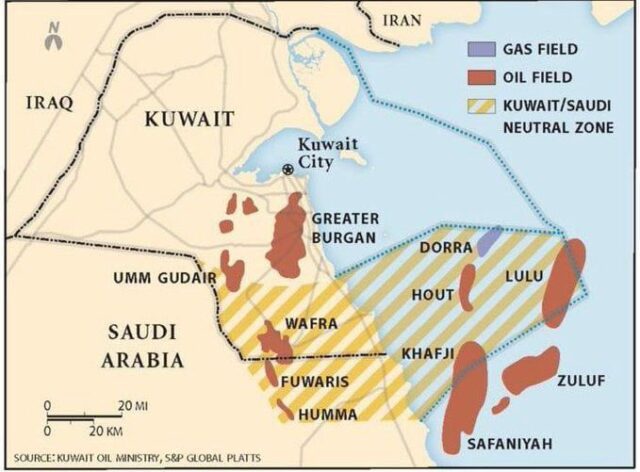Gulf countries – Saudi Arabia and Kuwait have agreed to develop a disputed gas field. The decision comes amid objections from Iran. The two gulf nations urged Iran to engage in negotiations.
While Riyadh and Kuwait decided to work together, Iran has termed this action as “illegal.” Iran, Kuwait, and Saudi Arabia are in a clash of interest in the Arash/Dorra maritime gas field.
“Saudi Arabia and … Kuwait affirms their right to exploit the natural resources in this area and that they will continue working to enforce what was agreed upon,” the Saudi Foreign Ministry said in a statement on 13 May.
Despite making this statement, the countries also urged Tehran to negotiate over the boundary of the gas field. The countries had a dispute over the field for decades.
The ministry said, “The Kingdom of Saudi Arabia and the State of Kuwait, as a single negotiating party, renew their invitation to the Islamic Republic of Iran to hold these negotiations.”
Last month, Iran objected to the proposal by Saudi Arabia and Kuwait had said the deal is in violation of “previously held negotiations.” Tehran also added that it “reserves its right to exploit” the field.
The development of the gas field has become a priority policy objective as energy prices have shot over the recent Russia-Ukraine crisis.
In the 1960s, Iran and Kuwait each awarded an offshore concession, one to the former Anglo-Iranian Oil Company (later came to be known as BP), and one to Royal Dutch Shell.
The dispute began as the two concessions overlapped in the northern part of the field. That area is estimated to hold about 220 billion cubic metres of reserves.
Both Iran and Kuwait have held a series of inconclusive talks for years. The sides could not resolve their disputed maritime border area, which has a huge deposit of natural gas.
When Iran began drilling the field in 2001, it prompted Kuwait and Saudi Arabia to conclude a maritime border deal. Part of the deal also allows the countries to jointly develop the offshore zone.
Iran last month suspended talks with regional rival Saudi Arabia, without citing any reasons. While the rivals have been talking in recent months, however, they are yet to reach any tangible agreement.
Diplomatic ties between Tehran and Riyadh were snapped in 2016 after protesters in Tehran had stormed into the Saudi embassy over the execution of an influential Shia leader in Sunni-majority Saudi Arabia.









